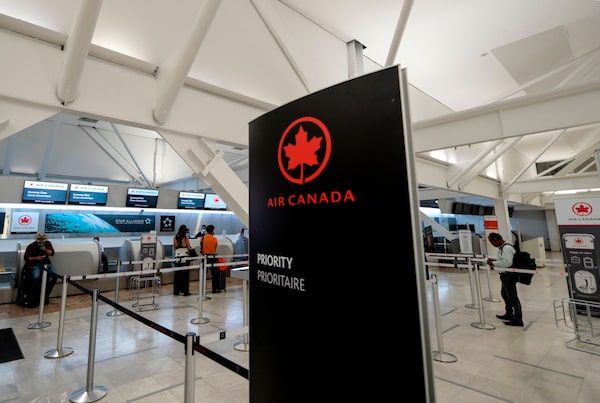
The Air Canada hall at the Benito Juarez International airport, in Mexico City, on May 20, 2020.PEDRO PARDO/AFP/Getty Images
Air Canada has raised $1.6-billion in share and debt offerings, shoring up its cash balance as it weathers the pandemic-driven collapse in demand for air travel.
Montreal-based Air Canada said on Tuesday the proceeds from the offerings announced last week will bolster its working capital and give it greater operational flexibility as it tries to survive the halt to most of its passenger service.
The offerings, which closed on Tuesday, boost Air Canada’s cash reserves to about $10-billion as the airline burns about $22-million a day in fixed expenses. Most of its 38,000 employees are on government wage subsidies and 20,000 have received notices their jobs will be eliminated as the carrier prepares for a slow recovery in demand for travel.
“This important financing will allow us to keep our strong relative position and better manage debt leverage and risk as government restrictions are lifted and the market recovers," Michael Rousseau, Air Canada’s chief financial officer, said in a press release. “The positive reaction from the public markets is a strong endorsement of the strength of our franchise.”
Air Canada sold more than 35 million shares at $16.25 each for a total of more than $575.6-million, and raised more than $1-billion in a bond sale. Investors exercised options to purchase additional securities, a sign demand for a stake in the carrier is strong, said Bank of Nova Scotia analyst Konark Gupta, who said the sales were “opportunistic” and not driven by need, given Air Canada’s already-strong cash reserves.
Air Canada’s $10-billion in cash "should go a long way in helping the airline retain a solid footing once the cash burn phase is over while providing a strong cushion during a potential second wave of COVID-19,” Mr. Gupta said.
Walter Spracklin, a Royal Bank of Canada stock analyst, called Air Canada’s move to raise capital “prudent,” even though it watered-down its share base and came at an 8-per-cent discount to the closing price before the deal was announced. Mr. Spracklin on Tuesday cut his 12-month share-price target to $23 from $25. The shares traded higher on Tuesday, rising by about 2 per cent to $16.69.
“While the issue was dilutive, we see the offering as beneficial to long-term viability,” Mr. Spracklin said.
Government border closures, travel quarantines and stay-at-home orders intended to slow the COVID-19 epidemic have hammered the global airline industry and put those without large cash stores at risk of failure. The Canada-U.S. border is closed, by mutual agreement, until June 21.
Air Canada said it has cut 85 to 90 per cent of its schedule, which is typically 1,500 daily flights to 217 airports on six continents. Sunwing Airlines, Porter Airlines and Air Transat have suspended operations while WestJet Airlines and Flair Airlines are operating greatly reduced schedules.
The airline crisis has prompted industry groups to call for government bailouts similar to those announced in Europe and the United States. The Canadian government has offered no airline-specific aid, but has provided 75-per-cent wage subsidies, to a limit of $847 a week until Aug. 29, to employees in private-sector work, and offered loans to large employers.
Air Canada has not borrowed under the program, but has taken a $788-million loan from Export Development Canada. When asked if WestJet would borrow money from the government, spokeswoman Morgan Bell said the Calgary-based airline “continues to review all options to determine our next steps.”
Your time is valuable. Have the Top Business Headlines newsletter conveniently delivered to your inbox in the morning or evening. Sign up today.